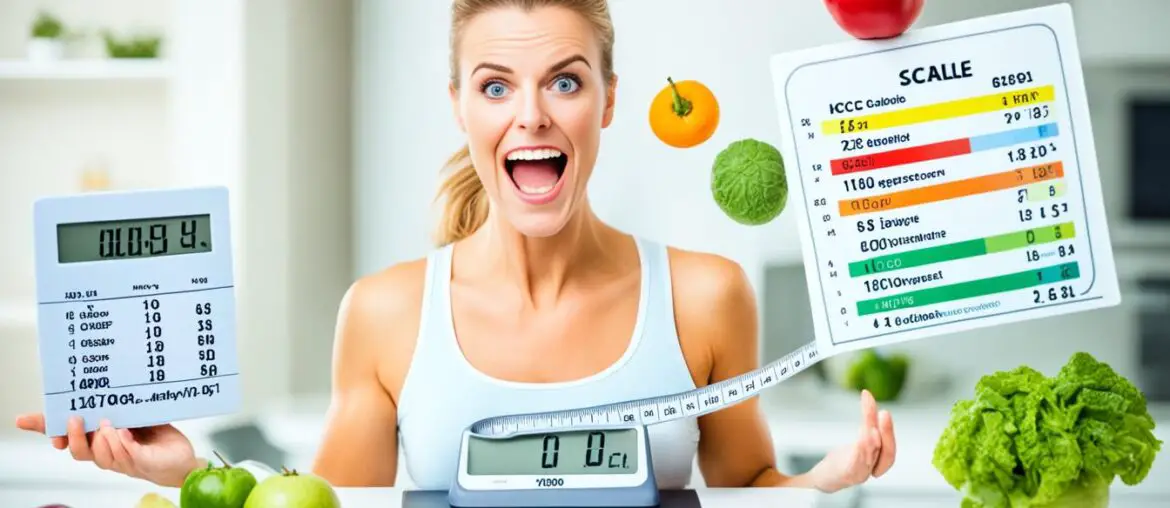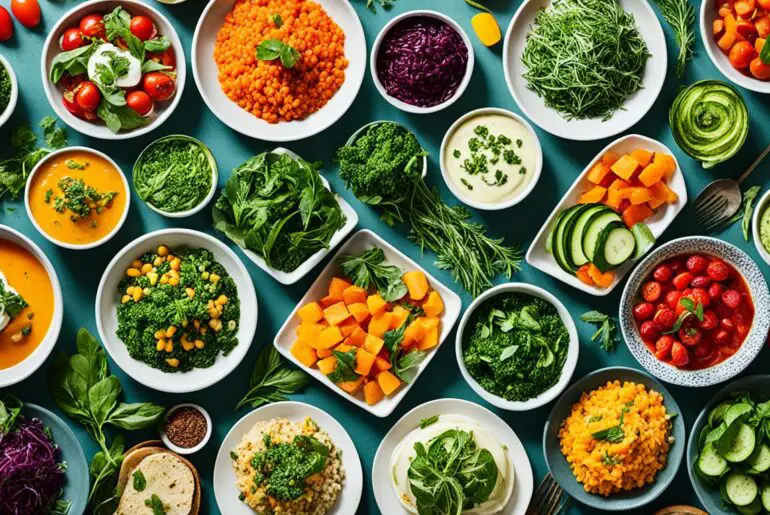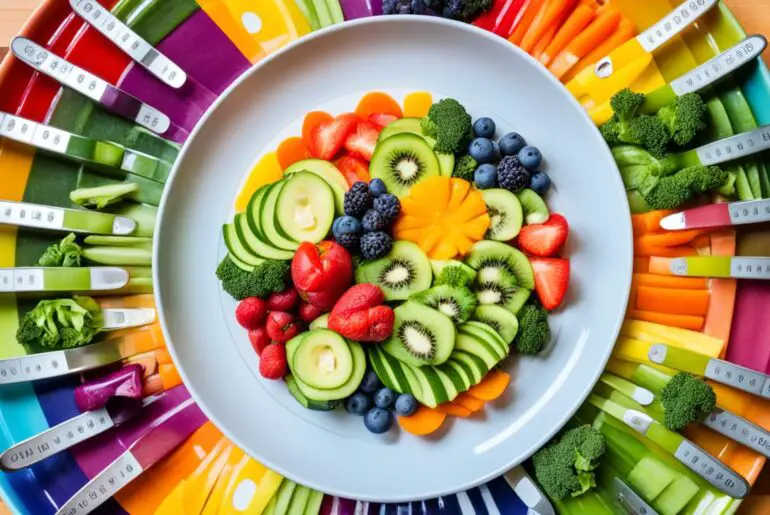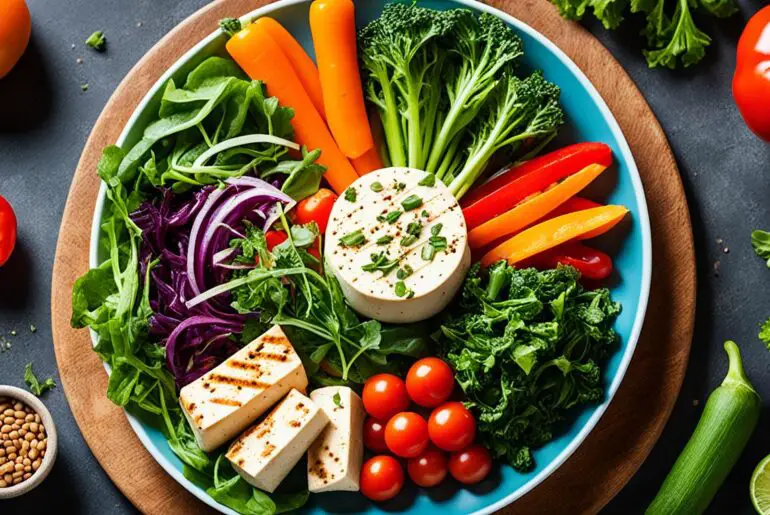Are you a vegetarian looking to lose weight with the HCG diet? Many people believe that a vegetarian or vegan diet is incompatible with this weight loss plan because of its emphasis on protein. But is that really the case? Can vegetarians achieve effective weight loss on the HCG diet? Let’s find out.
When it comes to the HCG diet, protein is a vital component for success. But for vegetarians, the challenge lies in finding suitable protein substitutes that align with their dietary choices. The good news is that there are various vegetarian options available to meet the daily protein requirements while following the HCG diet plan.
In this article, I will explore the tips, modifications, and meal plans specifically designed for vegetarians on the HCG diet. I will also discuss the importance of protein, the differences between vegetarian and non-vegetarian HCG diet plans, and the key guidelines to follow. Additionally, I will provide essential groceries and highlight the weight loss results and maintenance for vegetarians on the HCG diet.
Key Takeaways:
- Vegetarians can achieve effective weight loss on the HCG diet by making simple modifications and choosing suitable protein substitutes.
- The vegetarian HCG diet requires careful planning and the inclusion of high-protein vegetarian foods.
- Following the phases and guidelines of the diet, along with maintaining weight loss results, is essential for successful outcomes.
- The HCG diet provides a plant-based solution for weight loss for vegetarians.
Vegetarian HCG Diet Tips and Modifications
As a vegetarian on the HCG diet, there are some important tips and modifications you can make to ensure successful weight loss. While the original diet plan includes meat as a protein source, you can easily substitute it with vegetarian options. By making these dietary adjustments, you can still achieve your weight loss goals without compromising your vegetarian lifestyle.
Dietary Modifications
Instead of relying on meat for protein, incorporate vegetarian alternatives into your HCG diet. Some great options include:
- Cottage cheese: A high-protein dairy product that can be enjoyed as a snack or added to meals.
- Protein powder: A convenient and versatile option that can be used to make protein shakes or added to recipes.
- Tofu: A plant-based protein source that can be baked, stir-fried, or added to soups and salads.
- Tempeh: A fermented soy product that is rich in protein and can be used in various dishes.
- Eggs: A nutrient-dense option that can be boiled, scrambled, or used in omelets.
By incorporating these vegetarian protein sources into your HCG diet, you can still meet your daily protein requirements.
Probiotics for Gut Health
Gut health plays a crucial role in weight management. Including probiotics in your vegetarian HCG diet can help control bacteria in the gut and reduce food cravings. Consider adding fermented foods like yogurt, sauerkraut, or kefir to your diet. Alternatively, you can also take a probiotic supplement recommended by your healthcare provider.
Reading Labels
When following a vegetarian HCG diet, it is essential to read labels carefully. Pay close attention to the sugar and fat content of packaged foods. Opt for products with minimal sugar and fat to ensure you stay within the recommended dietary guidelines.
By making these modifications to the HCG diet, vegetarians can still achieve their weight loss goals while adhering to their vegetarian lifestyle. Remember to consult with a healthcare professional before starting any diet plan to ensure it aligns with your specific needs and health goals.
Vegetarian HCG Diet Meal Plan
Following a well-balanced meal plan is crucial for achieving success on the vegetarian HCG diet. By incorporating lean protein substitutes, a variety of fruits and vegetables, and low-calorie options, vegetarians can experience effective weight loss while still meeting their nutritional needs.
Here is a sample meal plan for the vegetarian HCG diet:
| Meal | Food Options |
|---|---|
| Breakfast |
|
| Snack |
|
| Lunch |
|
| Snack |
|
| Dinner |
|
Remember to drink plenty of water throughout the day to stay hydrated and support your weight loss goals.
Consult with a healthcare professional or nutritionist to customize the meal plan according to your specific dietary needs and calorie requirements.
Importance of Protein on the Vegetarian HCG Diet
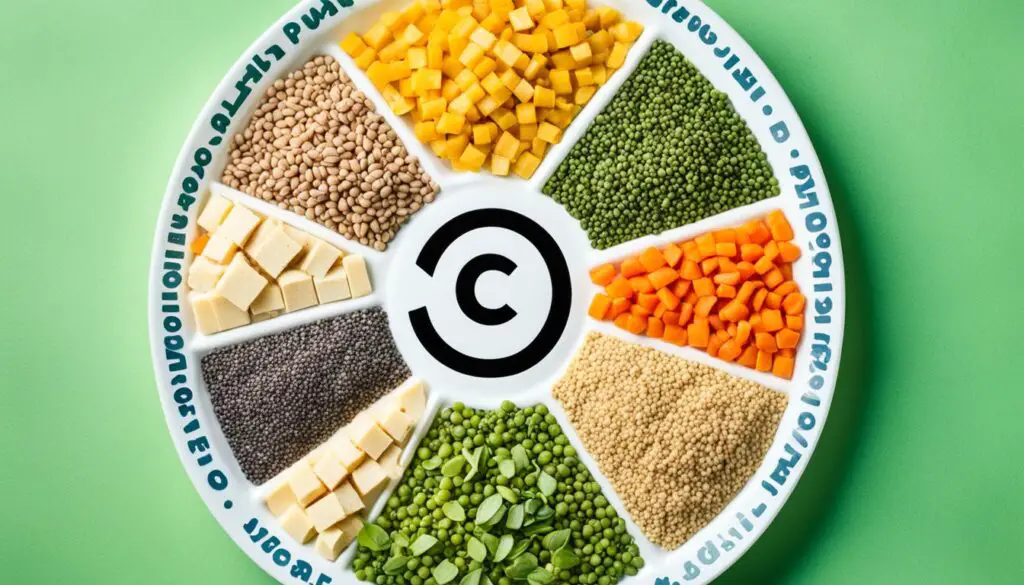
Protein plays a crucial role in the vegetarian HCG diet, contributing to successful weight loss and overall health. Adequate protein intake helps to moderate hunger hormones, keeping cravings and appetite in check. Vegetarians can leverage a variety of protein sources to meet their daily requirements and achieve their weight loss goals.
When following the vegetarian HCG diet, it is important to substitute meat proteins with suitable vegetarian options. Here are some protein-rich foods that vegetarians can incorporate into their diet:
- Cottage Cheese
- Tofu
- Tempeh
- Eggs
These vegetarian protein sources provide essential amino acids and help maintain muscle mass during calorie restriction. By including these protein-rich foods, vegetarians can ensure they are meeting their nutritional needs while promoting effective weight loss.
It is important to note that while protein is essential on the vegetarian HCG diet, it should be consumed in accordance with the recommended calorie requirements. Balancing protein intake with other nutrients is crucial for maintaining a healthy and well-rounded diet.
By prioritizing protein consumption and selecting appropriate vegetarian protein sources, individuals on the vegetarian HCG diet can optimize their weight loss journey and achieve their desired results.
Differences Between Vegetarian and Non-Vegetarian HCG Diet
The main difference between the vegetarian and non-vegetarian HCG diet lies in the protein sources. Non-vegetarians have the option to include meat such as chicken, beef, and fish in their diet, while vegetarians need to rely on alternative protein sources like cottage cheese, tofu, tempeh, and eggs. Despite this variation, both versions of the diet follow the same underlying principles of calorie restriction and the elimination of sugar and refined carbohydrates.
Both the vegetarian and non-vegetarian HCG diets have the potential to lead to rapid weight loss if followed correctly. The focus on calorie restriction helps create a calorie deficit, which prompts the body to use stored fat for energy, ultimately resulting in weight loss. By eliminating sugar and refined carbs, both diet plans aim to stabilize blood sugar levels and reduce cravings, facilitating the fat-burning process.
The key to success with either the vegetarian or non-vegetarian HCG diet is strict adherence to the prescribed guidelines. Both versions require discipline and commitment to achieve optimal results.
High-Protein Vegetarian Foods for the HCG Diet
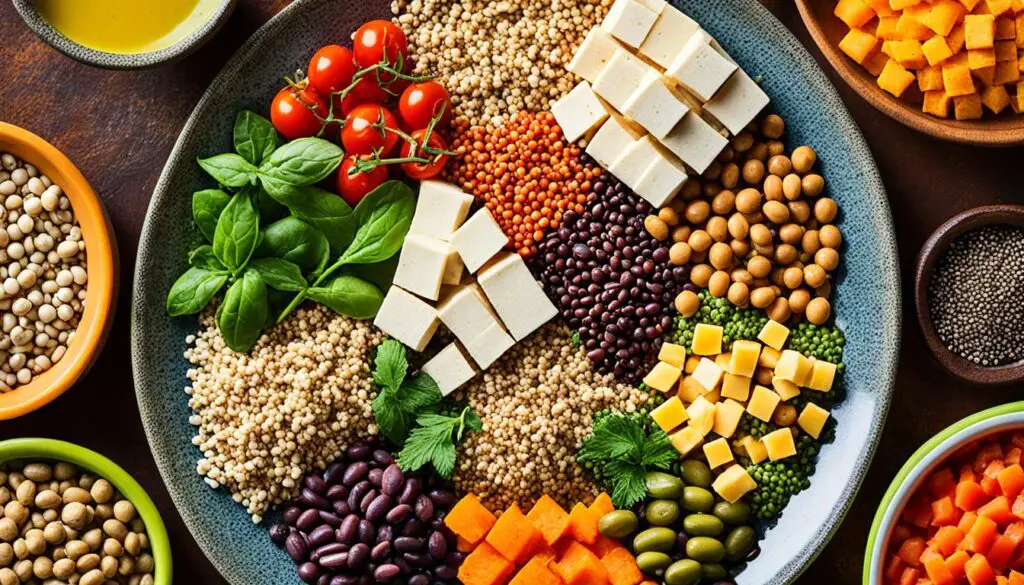
When following the HCG diet as a vegetarian, it is important to include high-protein foods in your meal plan to meet your nutritional needs. These foods not only provide the necessary protein but also help to keep you feeling full and satisfied during the weight loss process. Here are some excellent high-protein vegetarian options that you can incorporate into your HCG diet:
| Food | Protein Content | Calories | Fat |
|---|---|---|---|
| Cottage Cheese | 14g | 81 | 1g |
| Protein Powder | 20g | 120 | 2g |
| Tofu | 10g | 70 | 4g |
| Tempeh | 15g | 162 | 9g |
| Legumes (such as lentils and chickpeas) | 15g | 115 | 1g |
| Eggs | 6g | 72 | 5g |
These high-protein vegetarian foods are not only low in fat and calories but also provide essential nutrients required for overall health and well-being. Including a variety of these options in your HCG diet can help you meet your weight loss goals without compromising your vegetarian lifestyle.
Benefits of High-Protein Vegetarian Foods on the HCG Diet
Opting for high-protein vegetarian foods on the HCG diet offers several benefits, including:
- Increased satiety: Protein helps to keep you feeling full and satisfied, reducing hunger cravings and preventing overeating.
- Muscle preservation: Adequate protein intake during weight loss helps to preserve muscle mass and promote fat loss.
- Nutritional balance: High-protein vegetarian foods provide essential amino acids and nutrients necessary for optimal bodily function.
By incorporating these high-protein vegetarian foods into your HCG diet, you can achieve your weight loss goals while maintaining a plant-based diet.
Phases and Guidelines for Vegetarian HCG Diet
The vegetarian HCG diet follows a structured approach, consisting of three main phases – loading phase, weight loss phase, and maintenance phase. Each phase plays a vital role in achieving successful weight loss and long-term maintenance on the vegetarian HCG diet.
Loading Phase
The loading phase is the initial stage of the diet, lasting for two days. During this phase, you consume high-calorie foods to build up your fat stores. This helps prepare your body for the calorie-restricted weight loss phase that follows. It is important to focus on healthy, nutrient-dense foods during this phase to ensure a balanced start to your journey.
Weight Loss Phase
After the loading phase, you enter the weight loss phase, which typically lasts for 3-6 weeks. During this phase, your daily caloric intake is limited to 500-1200 calories, depending on your individual needs and guidance from your healthcare provider. It is vital to maintain a calorie deficit while ensuring adequate nutrition.
To meet your protein requirements on the vegetarian HCG diet, you can incorporate protein substitutes such as cottage cheese, tofu, tempeh, and eggs. These alternatives provide the necessary amino acids while adhering to your vegetarian lifestyle. Additionally, it is crucial to include a variety of vegetables, fruits, and low-calorie options to ensure your diet remains balanced and nutritious.
Maintenance Phase
Once you have achieved your weight loss goals, you enter the maintenance phase. This phase focuses on keeping the weight off and gradually reintroducing certain foods into your diet. It is essential to follow the guidelines provided by your healthcare provider to maintain your weight loss effectively. Paying attention to portion control, making mindful food choices, and adopting a healthy lifestyle are key factors during this phase.
By following the phases and guidelines of the vegetarian HCG diet diligently, you can experience significant weight loss and achieve your desired results. Along with the diet, remember to stay physically active, stay hydrated, and prioritize your overall well-being for long-term success.
| Phase | Description |
|---|---|
| Loading Phase | High-calorie foods to build up fat stores |
| Weight Loss Phase | Calorie-restricted phase with protein substitutes |
| Maintenance Phase | Focus on weight maintenance and gradual reintroduction of foods |
| Phase | Description |
|---|---|
| Loading Phase | High-calorie foods to build up fat stores |
| Weight Loss Phase | Calorie-restricted phase with protein substitutes |
| Maintenance Phase | Focus on weight maintenance and gradual reintroduction of foods |
Essential Groceries for Vegetarian HCG Diet
When following the vegetarian HCG diet, it is crucial to include essential groceries that support your weight loss goals. These groceries not only provide the necessary nutrients for your body but also contribute to a balanced and sustainable diet. As a vegetarian, you have various high-protein options to choose from, ensuring that you meet your protein requirements while adhering to the principles of the HCG diet.
High-Protein Options
To maintain adequate protein intake on the vegetarian HCG diet, consider incorporating the following high-protein options into your meal planning:
- Cottage cheese
- Tofu
- Tempeh
- Legumes
- Eggs
These plant-based protein sources offer an array of flavors and textures, allowing you to create diverse and satisfying meals throughout the diet. Whether you prefer the creaminess of cottage cheese or the versatility of tofu, these options provide the protein you need to support your weight loss journey.
Fruits and Vegetables
While the focus of the HCG diet is on protein, it is equally important to include fruits and vegetables in your grocery list. These nutrient-rich foods not only provide essential vitamins and minerals but also contribute to overall health and well-being.
When selecting fruits and vegetables, aim for a variety of colorful options to ensure you receive a wide range of nutrients. Some recommended choices include:
- Berries
- Leafy greens
- Cruciferous vegetables (broccoli, cauliflower, Brussels sprouts)
- Citrus fruits
Low-Calorie Beverages
In addition to protein-rich groceries and fruits and vegetables, it is important to stay hydrated throughout the vegetarian HCG diet. Opt for low-calorie beverages such as unsweetened tea and black coffee to quench your thirst without adding unnecessary calories or sugar to your diet.
Remember, reading labels is crucial when selecting groceries for the HCG diet. Look for organic options whenever possible, and check for minimal sugar and fat content to ensure you stay within the requirements of the diet.
By including these essential groceries in your meal planning, you can successfully follow the vegetarian HCG diet for weight loss. These nutritious and protein-packed options will support your journey towards a healthier lifestyle, helping you achieve your weight loss goals while maintaining overall well-being.
Weight Loss Results and Maintenance on Vegetarian HCG Diet

Following the vegetarian HCG diet can lead to rapid weight loss and increased energy and vitality. With the right dietary modifications and suitable protein substitutes, vegetarians can achieve results comparable to their non-vegetarian counterparts.
After completing the HCG diet, it is crucial to focus on maintaining weight loss. This can be achieved by gradually reintroducing certain foods into the diet while being mindful of calorie intake.
By following the maintenance guidelines, vegetarians can effectively sustain their weight loss results and avoid weight regain. Consistency is key in maintaining a healthier lifestyle and preventing future weight-related issues.
Reintroducing foods should be done in a gradual and controlled manner, allowing the body to adjust and prevent sudden weight fluctuations. Mindful eating and portion control play a vital role in maintaining weight loss over the long term.
Regular exercise and adopting healthy habits can further enhance the weight loss results achieved on the vegetarian HCG diet. Incorporate a combination of cardiovascular exercises, strength training, and flexibility exercises to achieve optimal physical fitness and overall well-being.
By staying committed, practicing self-discipline, and following the HCG diet maintenance guidelines, vegetarians can successfully consolidate their weight loss and enjoy the benefits of a healthier, more balanced lifestyle.
Conclusion
The vegetarian HCG diet offers a successful solution for weight loss on a plant-based diet. By implementing simple dietary modifications and incorporating suitable protein substitutes, vegetarians can achieve their desired weight loss goals. Following the structured phases and guidelines of the diet, along with including essential groceries, contributes to positive outcomes. The HCG diet not only facilitates weight loss but also provides a sustainable approach to long-term weight management for vegetarians.
The key to success on the vegetarian HCG diet lies in the careful selection of protein substitutes. By replacing meat with options like cottage cheese, tofu, tempeh, and eggs, vegetarians can still meet their daily protein requirements. Additionally, reading labels to ensure minimal sugar and fat intake is crucial for effective weight loss.
By adhering to the HCG diet’s phases and guidelines, incorporating essential groceries, and maintaining weight loss results through mindful calorie intake, vegetarians can achieve the desired weight loss on the HCG diet. So, if you’re a vegetarian seeking an effective weight loss program, the vegetarian HCG diet can provide a promising plant-based solution.
FAQ
Can vegetarians follow the HCG diet for weight loss?
Yes, vegetarians can still follow the HCG diet and achieve weight loss results. By making some dietary modifications and using suitable protein substitutes, vegetarians can adapt the diet to their needs.
What protein substitutes can vegetarians use on the HCG diet?
Vegetarians can use protein substitutes such as cottage cheese, protein powder, tofu, tempeh, miso soup, and eggs to meet their daily protein requirements on the HCG diet.
How can vegetarians modify the HCG diet to suit their needs?
Vegetarians can modify the HCG diet by replacing meat protein sources with vegetarian options like cottage cheese, tofu, tempeh, and eggs. They should also include probiotics in their diet to control bacteria in the gut and reduce food cravings.
What should a vegetarian HCG diet meal plan include?
A vegetarian HCG diet meal plan should include lean protein substitutes like cottage cheese, tofu, tempeh, and eggs. Fruits, vegetables, and low-calorie options like miso soup and protein shakes can also be included.
Why is protein important on the vegetarian HCG diet?
Protein is crucial on the vegetarian HCG diet as it helps to moderate hunger hormones and reduce appetite. Vegetarian protein sources such as cottage cheese, tofu, tempeh, and eggs can be used to meet the daily protein requirements.
What are the differences between the vegetarian and non-vegetarian HCG diet?
The main difference between the vegetarian and non-vegetarian HCG diet is the protein sources. Vegetarians need to rely on alternatives such as cottage cheese, tofu, tempeh, and eggs, while non-vegetarians can include meat options like chicken, beef, and fish in their diet.
What are some high-protein vegetarian foods for the HCG diet?
High-protein vegetarian foods for the HCG diet include cottage cheese, tofu, tempeh, legumes, and eggs. These foods provide a good amount of protein while being low in fat and calories.
What are the phases and guidelines for the vegetarian HCG diet?
The vegetarian HCG diet consists of three main phases – loading phase, weight loss phase, and maintenance phase. Each phase has specific guidelines and focuses on different aspects of the diet and weight loss journey.
What are the essential groceries for the vegetarian HCG diet?
Essential groceries for the vegetarian HCG diet include high-protein options like cottage cheese, tofu, tempeh, legumes, and eggs. Fruits, vegetables, and low-calorie beverages like tea and coffee are also important.
What are the weight loss results and maintenance on the vegetarian HCG diet?
Following the vegetarian HCG diet can lead to rapid weight loss and increased energy and vitality. After completing the diet, it is important to maintain weight loss by gradually reintroducing certain foods and being mindful of calorie intake.

